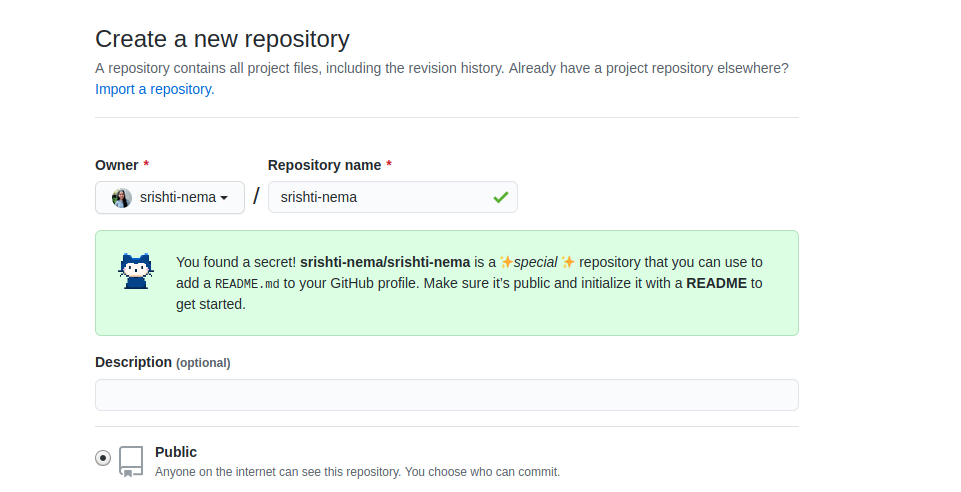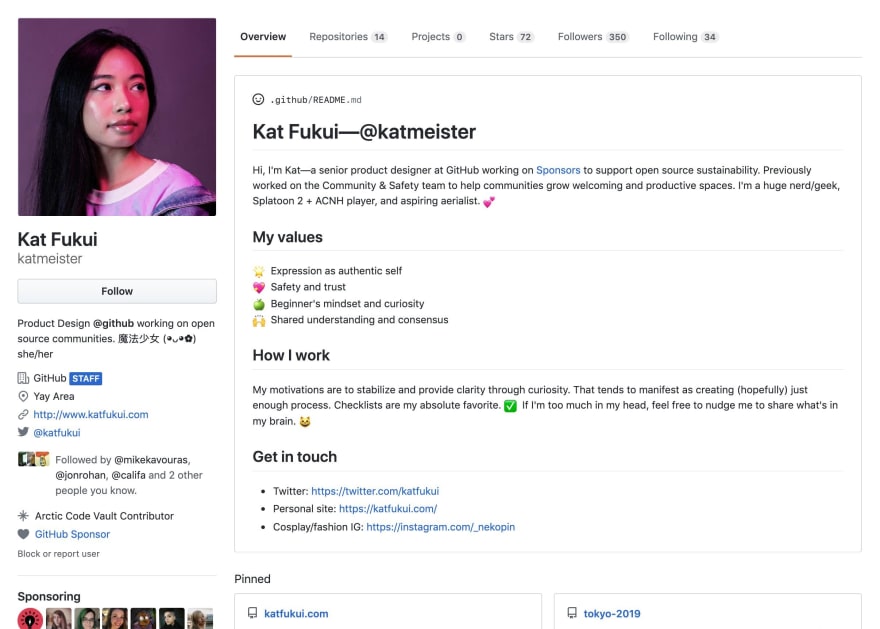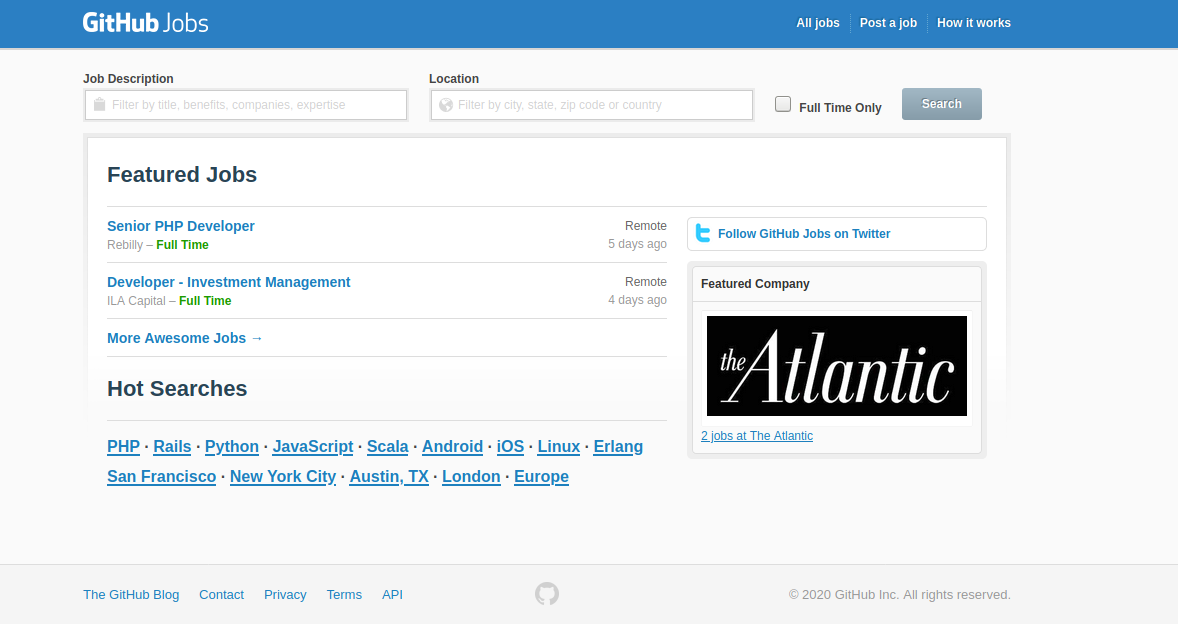Are GitHub profile readmes really important?
Recently, developers all over the world stumbled upon a secret feature by GitHub which allows the account holders to add a README to their GitHub profiles. Soon after people got to know about it, my social media feed was filled with interesting READMEs and blogs to create awesome READMEs for GitHub profile. With this trend getting so popular, I thought of adding a README to my profile too. Just when I thought of creating one, a question came across my mind before actually thinking about what to write. The question was - “Is this really worth the effort?”

Secret Features
Secret features are those features which are not documented while releasing a product. The team of developers who got into making the product and those who maintain it might be the only people who know about such features and that’s how they get their other name- “Hidden Features”. These are not known by anyone and get discovered when someone experiments with the product after it has been added. These might also be termed as “tips and tricks” which we can see even if we know almost nothing about development. These are features for users and only a few of these have got something to do with knowledge of building the product itself. Something similar to Easter Eggs in media and gaming.
Many softwares have such hidden features which are very basic with respect to the steps of using the product itself. Examples include Android, iOS, Windows 10, GitHub and many more. Some of the references showing how to use such features is given at the end of this blog.
The new addition
As mentioned in the beginning, a new addition to these has been the GitHub readme for developer profiles. People have started writing blogs and making videos on this, which is great! It is good to use such features for fun and it helps us to experiment with a particular feature in a good way to enhance our skills. Adding a README on GitHub profile is a great idea because for a developer, it is very important to showcase skills along with technical projects in a neat, concise way. In fact, a recruiter usually begins with checking someone’s GitHub profile while getting into the process of recruiting for a particular role. How can the README be added? A whole lot of resources can be found regarding this on sites like dev.to, Medium and YouTube. A few of these tutorials are given below :
- How To Create A GitHub Profile README
- How to add README.md to your GitHub Profile?
- How to add a README to your GitHub profile
- How to add an awesome README to your GitHub Profile
- How to add a README to your GitHub Profile
The discussion is all about this: Do GitHub READMEs really help? If yes, then how?
Developers and their love for GitHub

GitHub is one of the most popular hosting platform for version control. Developers put their projects up on GitHub and surely it is one of the finest tools for collaboration. GitHub shows the right way to work on a project with a team and makes the process smoother. In addition to features like creating and reviewing PRs, comments and Issues, it also has bots for error correction and other auto-deployment tools which helps in making the process seamless. It has become a space for everyone to create, build and showcase their tech skills in a transparent way. Developers believe that it is better to put up good, completed and innovative projects on individual profiles. Another beautiful outcome of being able to use versioning in a hassle free way is the world of open source. With increasing interests of people to make a career in STEM, open source made its way in the late 1990s to help distribute the software freely with users and developers all over the world having the right to use, view and modify the code to make it better. GitHub makes this involvement in open source easier. GitHub helps to keep your code safe and may help people notice your work, but what does a good GitHub profile look like?
GitHub and Jobs
GitHub does have a jobs portal of its own which can help your find the right job but people rarely use it due to the existence of more reachable and easy to use portals such as AngelList, Glassdoor, LinkedIn and Indeed. Still, GitHub plays its own role in hiring which is certainly not of a job search website.

Well, there is a misconception that a greener contribution chart on a GitHub profiles makes it a better developer. Wrong. It just makes the profile appear to be of a better developer. You might be doing some great projects and making good contributions, but you would still have those skills even if you don’t make those projects public. Then it might be about the number of followers. Greater number of followers imply that the person knows a lot about tech and development. This is also not true. Let me rephrase it- Greater number of followers imply that the person knows a lot of other people and enough tech to help them learn. The number of followers is an indication of fame and popularity. It does not necessarily say a lot about the person’s skills.
Then why do recruiters look at GitHub profiles at all? It makes the recruitment an easy process. Technical interviews are hard and looking at a candidate’s GitHub profile shows a lot about the projects done by the interviewee. But this is not the only criteria which recruiters have in mind. Even though I have not taken interviews so far, I believe that almost none of the recruiters sit to take away an opportunity from a candidate’s hand because of an empty GitHub profile. A bigger danger to a candidate would be half-assed, weak GitHub project links on resumes, which provides nothing but a few more lines on the resume to both the recruiter and the candidate. That can turn a good interview upside down.
Another important point is that it is easy to lie on GitHub. A greener chart as a misconception was already explored in the previous paragraphs. Wondering how to make your GitHub profile green? Just use a script. Check this link. GitHub, clearly, doesn’t show contributions properly. It is very easy to misuse this feature. Along with this, being a member of an organization or contributing to an open source organization might be a good thing to do as a developer but it has got nothing to do with getting a job or not. There is a major increase in the number of applicants for dev jobs today than it was about a decade ago. When there are already so many applicants, a team of interviewers might not even check all GitHub profiles properly before giving someone a call for an interview. Sometimes, even the resumes are not checked religiously which I find very odd and unfair. Hence, in such a competitive environment, the only places which can help you land a job can be either tech meetups and conferences, spent meeting people who recruit(basically, networking) or the interview room.

GitHub is not of much use especially for a person who has been in tech for a while and wants to switch. An experienced person can have zero contributions on their GitHub profiles for consecutive years and might get a job on the basis of their previous experience or solely on the basis of their talent. They migh be working mostly on private projects and private repositories and might have restriction on showing that on their GitHub profiles. It is also possible that much of the work they do is closed source or is not using GitHub. It is obvious that this doesn’t make them any less of a developer and provides them with the same opportunities as the one who is doing a lot of side projects on GitHub along with their work. There is nothing wrong in saying that an employed developer’s mind is mostly owned by their employer and that is okay. A lot of experienced developers also have a set of projects which they can easily use at interviews while switching jobs and focus only on updating those. The interview process and the job eligibility is another hot topic which can make for another long blog, but for now, we have an existing hiring process used in a lot of places. In such interviews too, being strong with a thing or two and having enough knowledge of the rest mentioned on your resume can help you land a job easily for a particular position. Also, people have hobbies and indulge in activities other than coding which may make them a better candidate even! For newbies, having a good GitHub profile is more important. It helps you get motivated and gives you a smoother start. It provides you visibility and you are building projects too. But again, it is a win-win only if you are genuine there. Statistics like number of followers, PRs to OSS organizations and commit activity can blur your focus from gaining knowledge.
Adding a README to GitHub
Coming to the README feature, it is great that GitHub thought of adding it. Now, the GitHub profiles would show a story associated with the journey of a developer. For newbies, it is very important to add one to the profile. For an active GitHub profile, a README would speak a lot for the person. I think it would be the second thing to be noticed by a recruiter in future after the picture(if they do). For an experienced developer too, it can show their respective paths and interests which can turn out to give great results. It is important to know what to add in those READMEs though. It is not necessary to show everything that you have done publicly, in that README. It is still GitHub and not your CV or your Twitter/LinkedIn. However, it is important to have what you show in the READMEs. I personally feel that it should match the way you do your projects too. What is meant by this is, never make your README too fancy if you haven’t done something fancier in your projects before. Also, if there is no README for a project you have mentioned in your profile README repository, then that may give a bad impression of you being a developer. Better to focus on making the profile better than the README and not otherwise. And mind you, even after all of this, you might only be happy and not become employed.
Because at the end of the day, a candidate doesn’t require a good GitHub profile,a good profile README, a lot of OSS contributions, many years of experience or even a lot of side projects to clear an interview. These are attributing factors for sure. But ultimately it boils down to the knowledge which you have. For a newbie too, it is important to clear those technical and coding rounds. The interpersonal and leadership skills which you have and show during the interview might be more important than those five projects which you made just to be on the safe side. This is not to discourage anyone to make projects, no. Get involved and enjoy the process. Build a lot but build meaningful.
P.S. I am still thinking about what should I write in my GitHub README, will definitely make it good.